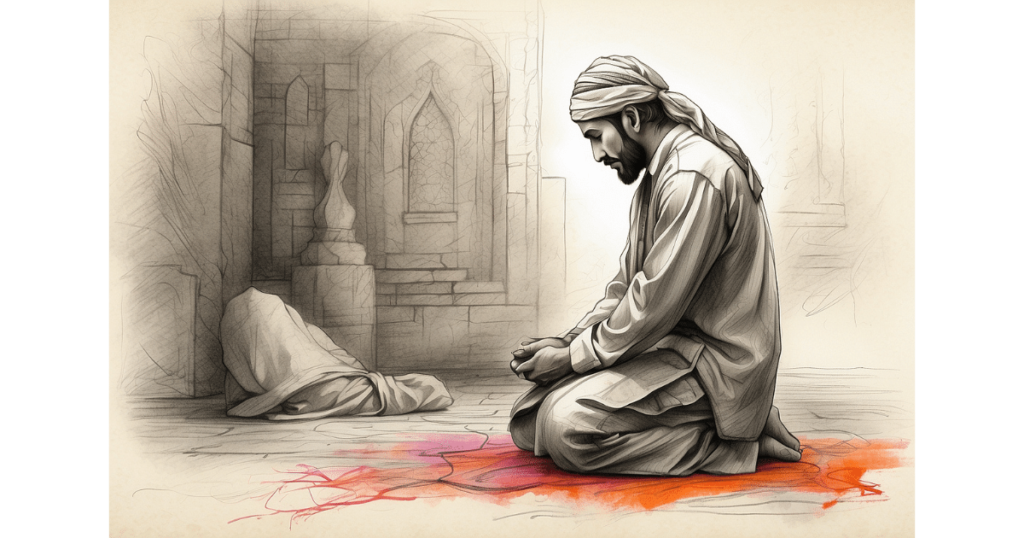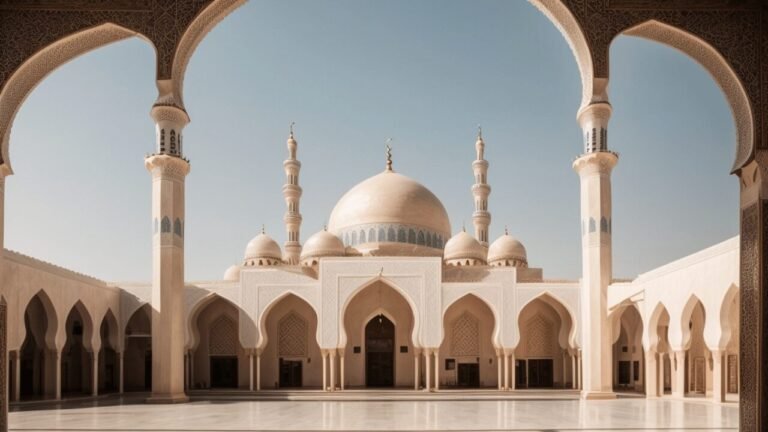Welcome to our guide on understanding the 5 prayers in Islam. We will explore the importance and rituals of prayers for Muslims. Understanding the importance of these prayers and their role in the lives of Muslims is essential for anyone seeking to learn more about the Islamic faith.
As Muslims, prayer is a vital part of our daily lives. We must pray five times daily, facing Mecca in the East. These prayers are delivered to Allah at specific times: dawn, noon, mid-afternoon, sunset, and after dark. They can be performed individually or corporately in a mosque led by an imam.
Not only does prayer allow us to connect with Allah, but it also serves as a way to connect with Muslims worldwide and throughout history. It fosters unity and solidarity among believers, reinforcing our bond as a community.
Table of Contents
Key Takeaways:
- Muslims pray five times each day, facing Mecca in the East.
- Prayer can be performed individually or with a congregation in a mosque.
- Prayers during Ramadan are believed to be particularly powerful.
- Islamic prayer focuses on worshipping Allah, seeking forgiveness, and resisting temptation.
- Prayer serves as a way to connect with Muslims worldwide and throughout history.
The Importance of Daily Prayer in Islam

Daily prayer, also known as salah, is a pillar of Islam and is very important to Muslims. It is considered a means of fulfilling their purpose of worshipping Allah and seeking His guidance and forgiveness. Muslims believe that prayers bring them closer to Allah and help them resist sins.
The five daily prayers, performed at specific times, remind them of their commitment to their faith. The prayers involve recitations from the Quran and physical movements such as standing, bowing, and prostrating. Praying five times daily helps Muslims maintain a constant connection with Allah and strengthen their faith.
In Islam, prayer is a ritual and a way of life. It serves as a daily spiritual discipline that helps Muslims align their thoughts, words, and actions with the teachings of Islam. Through prayer, Muslims seek to purify their hearts and minds, seek forgiveness for their sins, and seek guidance in making righteous decisions. It is a time for self-reflection and seeking closeness to Allah.

| Prayer | Time |
|---|---|
| Fajr | Dawn prayer |
| Dhuhr | Noon prayer |
| Asr | Late afternoon prayer |
| Maghrib | Sunset prayer |
| Isha | Night Prayer |
“Verily, the prayer prevents lewdness and evil deeds.” – Prophet Muhammad (peace be upon him)
The Rewards and Benefits of Daily Prayer

- Seeking forgiveness for past sins
- Resisting temptations and sins
- Strengthening faith and connection with Allah
- Guidance in decision-making
- Developing self-discipline and focus
- Finding inner peace and tranquility
- Expressing gratitude and seeking blessings
The Rituals of Daily Prayer in Islam
Prayer is an integral part of the Islamic faith, serving as a means of communication and worship between Muslims and Allah. The daily prayer rituals in Islam follow a structured and reverent approach, encompassing various physical and spiritual elements.
Praying in a Standing Position

One of Islam’s key daily prayer rituals is that it is performed in a standing position. Muslims believe that this posture demonstrates humility and submission to Allah. While standing, worshippers recite verses from the Quran and engage in supplications, expressing gratitude and seeking blessings from their Creator.
Prostration as an Act of Submission

Another significant aspect of Islamic prayer is prostration, where Muslims bow down and place their foreheads on the ground. This physical act symbolizes complete surrender and submission to Allah’s will. Prostration is performed multiple times throughout the daily prayers, emphasizing the worshipper’s acknowledgment of Allah’s greatness and authority.
Recitation of Sacred Texts

The recitation of sacred texts, particularly from the Quran, is an essential part of the prayer rituals in Islam. Muslims are encouraged to recite specific verses in each prayer, allowing them to connect with the teachings of the Quran and seek guidance from Allah. Reciting the sacred texts in Arabic, regardless of the individual’s native language, helps preserve the prayers’ originality and purity.
| Ritual | Description |
|---|---|
| Standing Position | Worshippers stand and recite verses from the Quran and supplications. |
| Prostration | Worshippers bow down and place their foreheads on the ground, symbolizing submission to Allah. |
| Recitation of Sacred Texts | Specific verses from the Quran are recited during each prayer, allowing for a deeper connection with Allah’s teachings. |
“The rituals of daily prayer in Islam hold great significance, as they provide a pathway for Muslims to establish a connection with Allah and seek His guidance” says Imam Ahmed, a religious scholar.
The Role of Wadu
Wudu, or ritual washing, is a crucial part of the 5 daily prayers in Islam. Muslims perform wudu to purify themselves before prayer. The process involves washing the hands, mouth, nose, face, arms, and feet. Learning how to make wudu correctly is essential for every Muslim worshipper.
The Significance of Community in Muslim Prayers

When it comes to daily prayers, Muslims have the option to pray individually or join others in the mosque for a communal prayer. Praying in a mosque is significant for Muslims, as it fosters a sense of unity and solidarity within the community.
One of the key features of praying in a mosque is the presence of an imam, who leads the congregation in worship. The imam acts as a spiritual leader, guiding the worshippers through the various movements and recitations of the prayer. This communal aspect allows Muslims to connect with others who share their faith and reinforces their sense of belonging to the larger global Muslim community.

Praying in a mosque also allows Muslims to witness and learn from each other’s devotion and dedication. It serves as a source of inspiration as worshippers observe others engaging in prayer and feel a sense of solidarity in their collective act of worship. The mosque becomes a sacred space where Muslims can unite, express their faith, and experience a deep connection with Allah and their fellow believers.
Overall, the significance of community in Muslim prayers cannot be overstated. Praying together in a mosque deepens the individual’s connection with Allah and strengthens the Muslim community’s bond. It serves as a reminder of the shared values, beliefs, and practices that unite Muslims worldwide, fostering a sense of solidarity and belonging.
Benefits of Community Prayer in Islam
| Benefits | Description |
|---|---|
| Unity and Solidarity | Praying together fosters a sense of unity and solidarity among Muslims, reinforcing their bond as a community. |
| Inspiration and Learning | Observing others’ devotion in prayer inspires and teaches worshippers, enhancing their own spiritual journey. |
| Sense of Belonging | Praying in a mosque provides a sense of belonging to the larger global Muslim community, strengthening one’s identity as a Muslim. |
| Support and Encouragement | Community prayer encourages Muslims to support and uplift one another, fostering compassion and empathy in social interactions. |
The Rewards and Benefits of Daily Prayer in Islam

Daily prayer in Islam offers many rewards and benefits for the worshipper. Through worship, Muslims seek forgiveness for their past sins and strength to resist future temptations. It is an act of obedience to Allah’s commandments and an opportunity to draw closer to Him. Daily prayer also deepens the individual’s personal relationship with God, allowing for moments of introspection and spiritual growth.
Prayer provides a powerful means of seeking forgiveness. Muslims understand that they are fallible beings who make mistakes, and prayer offers a way to seek forgiveness from Allah. By sincerely repenting and asking for forgiveness in their prayers, Muslims can find solace and peace in knowing that Allah is the Most Merciful and Forgiving.
“Prayer is the key to heaven, and forgiveness is the key to prayer.” – Prophet Muhammad
Through prayer, Muslims can cultivate a more profound sense of obedience to Allah. By following the prescribed times and rituals of daily prayer, they demonstrate their submission to Allah’s will. It becomes an act of obedience and a way to align their lives with the teachings of Islam.

Daily prayer in Islam brings numerous rewards and benefits. It allows Muslims to seek forgiveness, strengthen their faith, develop a personal relationship with Allah, and cultivate a sense of obedience. By engaging in regular prayer, Muslims find solace, seek guidance, and experience spiritual growth on their journey towards attaining closeness to Allah.
Conclusion: The 5 Prayers in Islam
Daily prayer holds immense significance in Islam, with Muslims required to engage in five prayers each day. These prayers serve as an act of worship, a means of seeking forgiveness, and an avenue for establishing a personal connection with Allah.
Whether you are a Muslim seeking to strengthen your faith or someone interested in understanding Islamic prayers is important. Muslims find spiritual fulfillment through daily prayer, foster communal bonds, and deepen their connection with Allah.
FAQ
How many times do Muslims pray each day?
Muslims are required to pray five times each day.
In which direction do Muslims pray?
Muslims face Mecca in the East when praying.
Are the prayers performed individually?
The prayers can be performed individually or with a group of people in a mosque, led by an imam.
What is the purpose of Islamic prayer?
The purpose of the Islamic prayer is to worship Allah, seek His forgiveness, and ask for help to resist temptation.







